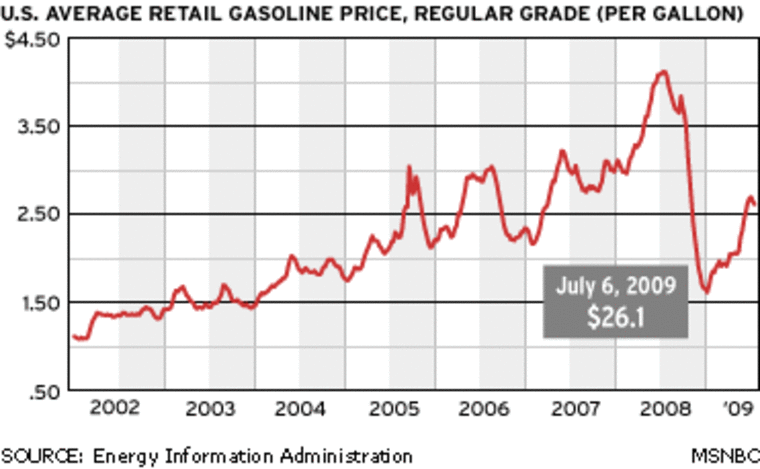You’re likely to hear a lot in the next several days from both political parties blaming the other party for the price of gasoline at the pump.
But bipartisan votes in Congress partly account for the lack of progress in expanding America’s energy supplies and increasing the efficiency of Americans’ fuel use.
Yet it’s also true that whatever progress Congress has made on expanding U.S. energy supplies has been due to bipartisan voting.
And in the next few months a congressional coalition across party lines is probably the only way new energy legislation would pass.
Still, in an election year such bipartisanism seems unlikely.
But one idea proposed Tuesday by Sen. Bob Menendez, D-N.J., has already gotten some Republican support. Menendez is calling for a 60-day moratorium on the 18.4 cents-per-gallon federal excise tax on gasoline.
Senate Majority Leader Bill Frist suggested Tuesday that in the short term "Americans "drive a little bit less," an idea also voiced by Frist's ideological opposite, Sen Barbara Boxer, D-Calif.
"I'd say to the American people: you have to take matters into your own hands," Boxer said. "You have to work to use less gasoline. Send a message through our driving habits that we can use less gasoline"

Boxer and other Democrats called for a windfall profits tax on oil companies. Boxer also called for a release of oil from the Strategic Petroleum Reserve.
Frist told reporters Tuesday that he had urged President Bush to order the Justice Department to investigate whether there was price gouging in the gasoline markets and any manipulation in energy futures markets.
But Frist added, “That’s not the answer,” and that demand for oil and gasoline was being driven in part by booming economies in China and India. He said he supported more U.S. domestic production including drilling in the offshore Outer Continental Shelf and in Alaska’s Arctic National Wildlife Refuge (ANWR).
For now — due to a bipartisan array of environmental-minded senators — Frist lacks the votes to get that done.
Historic vote on Alaska drilling
In last December’s historic vote to block oil and gas drilling in ANWR, it was a duo of Republican senators — Lincoln Chafee of Rhode Island and Mike DeWine of Ohio — who joined with most Democrats to kill the idea. (Both Chafee and DeWine are up for re-election this November.)
In the Dec. 21 showdown, Frist needed 60 votes to close off debate on a military spending bill with ANWR drilling included in it. Frist fell three votes short of victory. ANWR drilling advocate Sen. Ted Stevens, R-Alaska, called it “the saddest day of my life.”
Crossing party lines to vote for ANWR drilling were four Democrats, Daniel Inouye and Daniel Akaka of Hawaii, Mary Landrieu of Louisiana, and Ben Nelson of Nebraska.
Yet there are some energy proposals where enough Democrats do agree with enough Republicans to get something enacted into law.
Take, for example, last year’s energy bill, which ordered increased use of ethanol, provided $874 billion in tax breaks for alternative fuel and hybrid vehicles, and offered incentives for construction of new nuclear power plants.
On final passage of the bill in the Senate, 29 Democrats joined 49 Republicans. Among those voting for the bill were potential 2008 presidential contenders Frist, Evan Bayh of Indiana, George Allen of Virginia, and Sam Brownback of Kansas. Bayh is a Democrat, the others Republicans.
Had it not been for Democratic votes the energy bill wouldn’t have passed.
Likewise in the House of Representatives, 75 Democrats joined with 200 Republicans to pass the energy bill.
The Detroit factor
On a key fuel economy amendment to that bill, 18 Senate Democrats joined 46 Republicans to OK it. The amendment, co-sponsored by Republican Sen. Kit Bond of Missouri and Democratic Sen. Carl Levin of Michigan requires that rather than Congress mandating a specific increase in fuel economy by a certain date, the National Highway Traffic Safety Administration may order automakers to increase fuel economy standards “as fast as technology becomes available.”
Levin told his colleagues that the federal corporate average fuel economy (CAFE) system “gives a discriminatory boost to imported vehicles” because the fleets of the foreign-based carmakers include more smaller models and fewer trucks.
Levin made clear he was defending the interests of his constituents who work in GM, Ford, and Chrysler plants.
The CAFE requirement “does nothing for the environment, and it damages American jobs,” Levin contended in the floor debate.
But Sen. Joe Biden, D-Del., asked Levin, “Why don't we change the standard, the CAFE standard? Why don't we say that every vehicle, based on weight, no matter where it is made, must meet the same exact standard?”
An almost identical coalition of Republicans and Democrats who backed the Bond-Levin measure also voted to scuttle an amendment offered by Sen. Dick Durbin, D-Ill., that would have required car manufacturers to increase the fuel efficiency of passenger cars by 12.5 miles per gallon over 11 years.
One of the Democrats who voted against the Durbin fuel economy standard, Sen. Debbie Stabenow, D-Mich., said Tuesday, the fuel economy standard "might slow us down because it is not going to move as fast as the marketplace can. We can do so much better" with investments in hydrogen fuel cells and ethanol.
But Durbin told reporters Tuesday afternoon he'd re-introduce his fuel economy proposal "at the first chance I get. I want members to go on record again. You can't have a serious energy policy unless you have fuel efficiency standards for American vehicles."
Even though he voted for the energy bill last summer, Durbin said, "It's clearly a failure. If the gasoline prices, the heating oil prices, the natural gas prices in Midwest this winter are any indication, it was a failure. And we have to really re-think this."
Bipartisan backing for Gulf drilling
One can see bipartisan coalitions at work behind two of the current policy ideas.
Now before the Senate is a proposal to open a section of the Gulf of Mexico to oil and gas drilling. The co-sponsors of the bill are Republicans Sen. Pete Domenici of New Mexico and Sen. Jim Talent of Missouri, and Democrats Sen. Jeff Bingaman of New Mexico and Sen. Byron Dorgan of North Dakota.
Their bill would not allow drilling within 100 miles of the Florida coastline. But nonetheless in Florida there’s staunch bipartisan opposition to the idea of more drilling the Gulf.
Both Democratic Sen. Bill Nelson and Republican Sen. Mel Martinez, as well as the state’s Republican governor, Jeb Bush, oppose more drilling in the Gulf.
When it comes to energy, the decisive factor is often not the party label or ideology, but what state or region a member of Congress hails from.
Given regional self-interest, it’s predicable that legislators from Nebraska, Missouri and other corn-growing states are ardent champions of legislation mandating use of ethanol made from corn. Their corn loyalty overrides any party loyalty.
Dispute over ethanol
Senators from coastal states, far from the corn fields, oppose the ethanol requirement, reasoning that it will increase costs for consumers in places such as New York and Philadelphia.
In last summer’s energy debate, Sen. Charles Schumer, D- N.Y. and other ethanol skeptics lost their move to drop the renewable fuels mandate from the energy bill.
Voting against Schumer were 29 Democratic senators, including the ones such as Bayh and Sen. Russ Feingold, D- Wisc., another 2008 presidential contender, who represent corn states. Forty GOP senators also voted against Schumer.
That vote indicates that sometimes bipartisanism doesn’t lead to lower prices, at least in the short run.
Since ethanol can’t be shipped in the already established infrastructure of U.S. pipelines because it too easily absorbs water, it must be moved by truck or rail.
This has added to supply problems and higher costs at the pump for drivers on the East Coast, much as critics last summer contended it would.
On Tuesday, Bush announced steps to ease federal rules on gasoline blends. This should permit refiners to not use ethanol to meet federal clean air standards.
The Renewable Fuels Association, which Bush addressed Tuesday, has argued that other factors — the high cost of crude oil, the political instability in oil-producing countries such as Nigeria — have more to do with gasoline prices than ethanol does.
And Nebraska's Nelson, a supporter of ethanol, said the corn-based fuel "is an easy target" for those unhappy with high prices at the gasoline pump. "The truth of the matter is the refiners and everybody in the oil industry has known about the needs and could have been well prepared for this. Why weren't they prepared to take care of the additive in time to meet the demand?"
Ethanol has caused a boom in Nebraska. When Nelson ended his tenure as governor of Nebraska in 1999, the state had seven ethanol plants. Now there are 12 plants in Nebraska and several more being built. "Nebraska is about to overtake Illinois as the second largest ethanol-producing state," he noted.
If more domestically produced oil and gas is your favored solution to high gasoline prices, you can find a bipartisan alliance for increased drilling in the United States and off its coastline, but also one against such drilling.
Sens. Mark Pryor, D- Ark., and John Warner, R-Va., have teamed up on a bill that would allow more offshore drilling for natural gas to those coastal states that want it.
But on the anti-drilling side, the Chafee-DeWine duo represent the Republican environmentalists’ constituency that opposes drilling in ANWR.
Until the November elections, the arithmetic of the votes looks unlikely to change.
